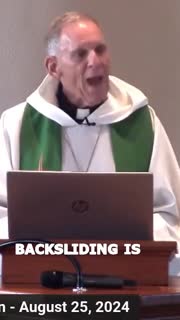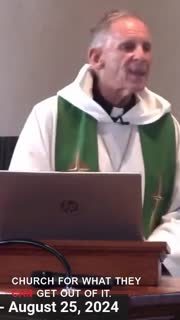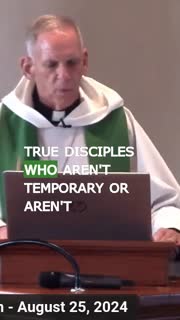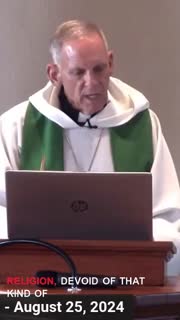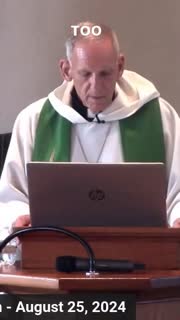Enduring Faith: The Challenge of True Discipleship
Devotional
Sermon Summary
Bible Study Guide
Sermon Clips
1. "Backsliding is well-documented in Scripture. The Bible is filled with stories of people who started out really, really well, but who finished poorly. In fact, that's the common thing. When you go especially to the Old Testament, it's in the later years of life that people fail. It was true for every major biblical character." [32:17] (26 seconds)
2. "Some do church for what they can get out of it. They're looking for a personal advantage. All of this I am the bread of life talk came just after Jesus had fed 5,000 men, closer to 10,000 if you add the women and children. And Mark tells us that many followed because of that miracle. It says it point blank. Many of them followed because he had fed them." [37:25] (27 seconds)
3. "Churches have become a place to go to get our needs met instead of the place where we go to serve God and others. And most people bail on church once they've gotten all they can get out of it. And they move on to greener pastures where they think there might be better preaching, better singing, more youth programs, nicer campuses, better potlucks." [38:06] (25 seconds)
4. "God is who he is and you take him for who he is. Or you don't get him at all. Some leave because they're simply offended. Verse 61. Aware that his disciples were grumbling about all of this, Jesus said to them, meaning to his disciples, does this offend you? Are you offended too? We live in a day and a time where just being a Christian, the fact that you call yourself a Christian will offend many people." [40:16] (33 seconds)
5. "True disciples who aren't temporary or aren't looking to backslide, they have to embrace the entire gospel, not just the bits and pieces that our fallen culture will tolerate. It's all or none when it comes to the gospel of Jesus Christ. So many backslide because they're looking for what they can get. Others backslide because God isn't there to fulfill their personal agenda." [41:07] (28 seconds)
6. "Can a person backslide and lose their salvation? It's a question that's been debated for almost 2,000 years. When you see a person who is seemingly backslidden, did they lose their salvation, or were they never really born again? Scripture overwhelmingly leans toward the idea that you can't lose your salvation. Once you're born again, you can't really be unborn again." [43:38] (29 seconds)
7. "Living a life outside of the blessing of God, living in a backslidden condition, what Paul called a carnal Christian, is not really an option. It is a miserable existence. There's not much more miserable than a Christian who can no longer enjoy the evils of sin because they're born again, but they don't really want to follow Jesus because they're filled with worldliness." [51:22] (29 seconds)
8. "Religion, devoid of that kind of relationship, dopes us, as Mark said, into believing we're saved when in reality we are lost. Jesus said in the last days that you'll stand before that throne of grace, and he'll say to many, or they'll say to him, Lord, didn't we heal the sick, raise the dead? Didn't we feed the poor? Didn't we do all these things? Jesus will reply to them, depart from me, you who do works of iniquity, because I never knew you." [48:11] (36 seconds)
9. "Too many people fall away too quickly. We see it all the time. People begin the race, but the race that God has called us to is not a sprint, it's a marathon. It's a marathon where we not only have to begin well, but we've got to finish the race. And failure to finish the race is a clear indicator that you were never really born again." [50:36] (27 seconds)
10. "God has the ability and the desire to turn up the heat so that we can live into and become what he's called us to be and what he paid the price for us to become. Not temporary, not backslidden, but full-on dedicated followers of Jesus Christ." [52:00] (23 seconds)
Ask a question about this sermon
2. "Some do church for what they can get out of it. They're looking for a personal advantage. All of this I am the bread of life talk came just after Jesus had fed 5,000 men, closer to 10,000 if you add the women and children. And Mark tells us that many followed because of that miracle. It says it point blank. Many of them followed because he had fed them." [37:25] (27 seconds)
3. "Churches have become a place to go to get our needs met instead of the place where we go to serve God and others. And most people bail on church once they've gotten all they can get out of it. And they move on to greener pastures where they think there might be better preaching, better singing, more youth programs, nicer campuses, better potlucks." [38:06] (25 seconds)
4. "God is who he is and you take him for who he is. Or you don't get him at all. Some leave because they're simply offended. Verse 61. Aware that his disciples were grumbling about all of this, Jesus said to them, meaning to his disciples, does this offend you? Are you offended too? We live in a day and a time where just being a Christian, the fact that you call yourself a Christian will offend many people." [40:16] (33 seconds)
5. "True disciples who aren't temporary or aren't looking to backslide, they have to embrace the entire gospel, not just the bits and pieces that our fallen culture will tolerate. It's all or none when it comes to the gospel of Jesus Christ. So many backslide because they're looking for what they can get. Others backslide because God isn't there to fulfill their personal agenda." [41:07] (28 seconds)
6. "Can a person backslide and lose their salvation? It's a question that's been debated for almost 2,000 years. When you see a person who is seemingly backslidden, did they lose their salvation, or were they never really born again? Scripture overwhelmingly leans toward the idea that you can't lose your salvation. Once you're born again, you can't really be unborn again." [43:38] (29 seconds)
7. "Living a life outside of the blessing of God, living in a backslidden condition, what Paul called a carnal Christian, is not really an option. It is a miserable existence. There's not much more miserable than a Christian who can no longer enjoy the evils of sin because they're born again, but they don't really want to follow Jesus because they're filled with worldliness." [51:22] (29 seconds)
8. "Religion, devoid of that kind of relationship, dopes us, as Mark said, into believing we're saved when in reality we are lost. Jesus said in the last days that you'll stand before that throne of grace, and he'll say to many, or they'll say to him, Lord, didn't we heal the sick, raise the dead? Didn't we feed the poor? Didn't we do all these things? Jesus will reply to them, depart from me, you who do works of iniquity, because I never knew you." [48:11] (36 seconds)
9. "Too many people fall away too quickly. We see it all the time. People begin the race, but the race that God has called us to is not a sprint, it's a marathon. It's a marathon where we not only have to begin well, but we've got to finish the race. And failure to finish the race is a clear indicator that you were never really born again." [50:36] (27 seconds)
10. "God has the ability and the desire to turn up the heat so that we can live into and become what he's called us to be and what he paid the price for us to become. Not temporary, not backslidden, but full-on dedicated followers of Jesus Christ." [52:00] (23 seconds)
